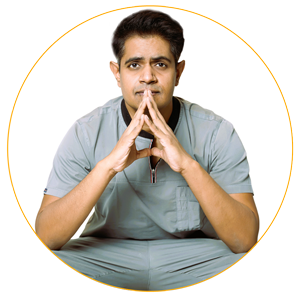Morbid Obesity Correction
Action for
a healthier future
There is no doubt that obesity is a major cause of a number of serious and potentially life-threatening diseases.

There is no doubt that obesity is a major cause of a number of serious and potentially life-threatening diseases. The condition can lead to type 2 diabetes, heart disease, stroke, and it has also been linked to some cancers, including breast cancer and colon cancer. A recent study suggested a link between obesity and pancreatic cancer. Furthermore, obesity can severely damage a person's quality of life, has psychological and social impact and often triggers depression in people. Based on these factors, it is not difficult to understand why men and women look for various weight loss interventions to combat their obesity.
The unwanted fat stored in the body creates bulges in different places of the body which are not aesthetically pleasing to the eye and no matter how hard we try to get rid of it, the deposits usually win the fight and what you are left with is an overweight, bulged body which despite of exercise, diet and other measures is not ready to leave. When you gain weight, fat cells increase in size and volume. Liposuction reduces the number of fat cells in an area and surgical excision like abdominoplasty, brachioplasty or medial thigh lift removes the excess skin and tones the area. But these procedures work best when the person's BMI is preferably less than 35 and have localised deposits of fat in those area.
Men and women who have generalised obesity, BMI more than 40 or more than 35 with significant diseases like Diabetes, High BP, Heart diseases etc should not seek liposuction of multiple areasfor weight loss as these procedures are not primarily weight loss procedures and they lie in a spectrum of body contouring surgery. Though patients with such high BMI can get liposuction done but then it should be done in stages, not more 10% of their body weight of fat should be suctioned in single stage preferably as chances of landing into complications are higher if more than this amountis liposuctioned. They should adapt to a better lifestyle withan aim for weight loss with regular exercises and strict diet control and then get liposuction done for resistant fatty areas later. Men and women with higher BMI should be given option of bariatric surgery only. Though most of the people with such high BMI who visit our clinic want to get rid of this fat by liposuction only and want to avoid bariatric surgery but-
Bariatric surgery is the treatment of choice and surgical answer for Men and women with generalised obesity or BMI more than 40 who have failed with lifestyle changes.
Weight loss surgery, also known as bariatric surgery, is now one of the most common interventions for morbid obesity correction. This surgery is very effective in treating diabetes, high blood pressure, sleep apnea and high cholesterol, among many other diseasesand also have an ability to prevent future health problems. Men and women after bariatric surgery enjoy better quality of life and a much longer lifespan. This surgery may make the stomach smaller and bypass a portion of the intestine also. This results in less intake of food and changes how the body absorbs food for energy (better metabolism) resulting in decreased hunger and increased fullness thus improving the body's ability to achieve a healthy weight.
Bariatric surgery per se is not a domain of Plastic surgeons essentially so Dr Amit Agarwal will not perform this procedure, but he will guide you whether you are a candidate for it or not and will also help you in connecting with the best bariatric surgeon for you.
Role of Dr Amit Agarwal in patients after bariatric surgery
After bariatric surgery, there's massive loss of weight in most of the patients resulting in very significant amount of loose and excess skin in many areas of the body which needs cosmetic correction. The cosmetic procedures commonly done after bariatric surgery by plastic surgeons are lower body lift, upper body lift, medial thigh lift.
Discussions during a morbid obesity correction consultation should include
- Discussion on the body reshaping goals.
- Any past or present medical conditions or surgeries.
- Any drug allergies and medical treatments.
- Any on-going supplements
- Alcohol, tobacco intake
- Information about future diet restrictions after surgery.
An Ideal candidate for bariatric surgery
- If your BMI is 40 or greateror more than 35 with significant diseases like Diabetes, High BP, Heart diseases etc.
- You should be conscious towards improving your body shape and want to prevent yourself from morbid diseases in future.
- You are open to discussion
- You should really know well about what surgery you have been advised or are planning to undergo
- You should have realistic expectations
Dr Amit Agarwal's focus during morbid obesity correction consultation
- Measure your BMI, assess your areas of fat deposits over whole body to assess benefit of liposuction if done.
- Assess your sagging skin and muscle tone, any hernias.
- Examine abdomen area-how much of fat is outside the muscles (can be targeted by liposuction) and how much is intraabdominal; inside with internal organs (cannot be targeted by liposuction)
- Examine your overall health, and risk factors
- Discuss the options for your condition
- Take photographs
- Risk and complications related to surgery
- Highlight the importance of maintaining a healthy lifestyle even after surgery.
- Role of Dr Amit Agarwal after bariatric surgery
Questions to be asked with Dr Amit Agarwal about morbid obesity correction
- Are you a good candidate for the procedure?
- Who will perform the surgery?
- What are the risks and complications related to the surgery?
- How long will be my recovery period?
- How long do I have to stay in the hospital?
- What will be my diet restrictions?
Preparations to be done for the surgery
surgery is not a domain of Plastic surgeons essentially so Dr Amit Agarwal will not perform the procedure but he will guide you whether you are a candidate for it or not and will also help you in connecting with the best bariatric surgeon for you.
- You have to agree to specific lifestyle changes recommended by your referred or chosen bariatric surgeon. These changes are meant to help you achieve and maintain weight loss.One of these main changes includes eating a healthier and fixed quantity of diet for the rest of your life.
- You should stop smoking if you are a smoker before at least two weeks prior to the surgery.
- Get the tests done prescribed by your referred or chosen bariatric surgeon.
- Strict scheduled diet to be followed by you before surgery.
- Avoid taking anti-inflammatory drugs and herbal supplements as they aggravate bleeding.
- All pre surgical work up investigations should be shown to the operating surgeon and the anaesthetist, and we will evaluate your fitness for the surgery. You will be given date for the surgery only after you are declared fit for the procedure.
- Admission will be done a day prior in the hospital where the surgery would be performed.
- Written consent form will be signed explaining the procedure after the admission.
- Meeting with the anaesthetist for Pre-Anaesthetic check-up before the surgery.
Morbid obesity correction procedure includes
Weight loss, or bariatric surgery involves removing or changing a part of a person's stomach or small intestine so that they do not consume as much food or absorb as many calories as before. Surgery can make the stomach smaller, or it can bypass part of the digestive system.
This can help an individual to lose weight and also reduce the risk of high blood pressure, type 2 diabetes, and other aspects of metabolic syndrome that can occur with obesity.
Bariatric surgery is done with small incisions using minimally invasive laparoscopic surgical techniques with less pain, fewer complications, shorter hospital stays and a faster recovery. These operations are extremely safe, with very low complication rates.
Gastric sleeve or gastric band
The surgeon uses either gastric sleeve or a gastric band technique to make the stomach smaller.
After the operation, a person cannot consume more than about one cup of food during each sitting. This significantly reduces food intake.
Gastric sleeve/bandsurgery is done using general anaesthesia. The surgery entails dividing your stomach into two unequal parts. About 80 percent of the outer curved part of your stomach is cut away and removed. The edges of the remaining 20 percent are then stapled or sutured together. This creates a banana-shaped stomach that's only about 25 percent of its original size. Gastric band is a silicone device placed and secured around the top part of the stomach creating a small pouch above the band to limit the amount of food a person can eat.
Gastric bypass
The procedure enables food to bypass parts of the digestive system, specifically the first part of the mid-section of the small intestine. It may also reduce the size of the stomach. This is generally more effective than gastric sleeve/band, but there is a higher risk of vitamin and mineral deficiencies, as the body can no longer absorb as many nutrients as before.
The small incisions in your abdomen typically heal quickly. The minimally invasive nature of the surgery helps you recover faster than a procedure where your abdomen is opened with a larger incision.
Recovery after the surgery
Before bariatric surgery is performed, you have to agree to specific lifestyle changes recommended by your surgeon. These changes are meant to help you achieve and maintain weight loss. The major change includes eating a healthier and a smaller diet for the rest of your life. Usually, it takes around 2 days for you to be discharged from the hospital after Bariatric surgery. However, it may take around 2-5 weeks for you to recover completely.
Your bariatric surgeon will recommend the best diet for you before and after your surgery. He would suggest may be similar to the general dietary guidelines below.
- Two weeks before surgery-Increase protein, lower carbohydrates, and eliminate sugar from your diet.
- Two days before and the first week after surgery-Ingest only clear liquids that are caffeine - and carbonation-free.
- For the next three weeks-You can add pureed food to your diet.
You'll usually be able to eat regular, healthy food about one month after your surgery. You'll find that you eat less than before the procedure because you'll get full quickly and won't feel as hungry.
Your limited diet and smaller meals may cause some nutritional deficiencies. It's important to make up for this by taking multivitamins, calcium supplements, a monthly B-12 shot, and others as recommended.
It is also very important to maintain a healthy lifestyle to maintain your shape and contour.
Risk and complications post-surgery
Before going for the surgery, you should always understand the risks and potential complications related to surgery. Morbid obesity correction usually gives desired results but there can be some risks involved which include:
- Bleeding from the surgical wound or inside your body can lead to shock when it's severe.
- Surgery and the recovery process can increase your risk of Deep vein thrombosis, a blood clot forming in your vein, usually in a leg vein. Which can lead to Pulmonary embolism when part of a blood clot breaks off and travels to your lungs.
- Surgery can increase the risk of an irregular heartbeat, especially atrial fibrillation.
- Pain can cause you to take shallow breaths which can lead to a lung infection, like pneumonia.
- Stomach fluids can leak from the suture line in your stomach where it was sewn back together.
- Part of your gastric sleeve can close, causing an obstruction in your stomach.
- Vitamin deficiencies. The section of your stomach that's removed is partly responsible for the absorption of vitamins your body needs. Unless you take vitamin supplements, this can lead to deficiencies.
- Heartburn (GERD). Reshaping your stomach can cause or worsen heartburn. This can typically be treated with medications.
These are the risks and possible complication which should be discussed by you with your bariatric surgeon before the procedure.
The total benefits of morbid obesity correction will be seen after few months. It is also very important to maintain a healthy lifestyle to maintain your shape and contour. If you are unable to maintain it or plan an exercise regime, there can be deposits of unwanted fat again after few years. So a healthy lifestyle is a must after bariatric surgery.
Do's and don't
- You should not hide any major chronic illnesses with your doctor.
- You should always discuss any previous surgery or treatments without hesitation.
- You should immediately consult Dr Amit Agarwal if you have any complication.
- It is also very important to maintain a healthy lifestyle to maintain your shape.
Frequently Asked Questions
If your BMI is 40 or greater,or more than 35 with significant diseases like Diabetes, High BP, Heart diseases etc.then you should opt for bariatric surgery for weight loss.
Yes, definitely-if you follow a healthy lifestyle and follow the doctor's instructions you will lose massive weight. There will be significant amount of loose and excess skin in many areas of the body after massive weight loss which would need cosmetic correction definitely after a year of bariatric surgery. You will get maximum benefit in terms of better body shape and effectively slimmer waistline after lower body lift, upper body lift and medial thigh lift.
You can start exercising after 4 to 6 weeks of surgery and as bariatric surgeon suggests depending on your healing process.
Many patients (up to 50%) may regain a small amount of weight (approximately 5 percent) two years or more following their surgery. However, longitudinal studies find that most bariatric surgery patients maintain successful weight-loss long-term.
After massive weight loss, most patients may have loose or sagging skin of arms, abdomen, back, breast, thigh. The degree of sagging depends upon amount of weight lost, age,genetics and adaptation to better lifestyle. Dr Amit Agarwal recommend a wait period for at least 12-18 months before cosmetic surgery to improve the body contours and shape.
Morbid Obesity Correction Images
Indivisual results may vary from person to person.
These pictures are shown for the purpose of education only.


Know your surgeon better

Best plastic surgeon, Dr. Amit Agarwal is an American Board Certified, extensively trained, and best Plastic & Aesthetic surgeon in Lucknow. He is the Chief Plastic Surgeon heading the Department of Plastic, Microvascular, and Craniofacial surgery at Vivekananda Polyclinic and Institute of Medical Sciences, Lucknow, U.P, India. He maintains a busy practice at Avadh and Nishat Hospital and his own center - Kayakriti Plastic Surgery & Dental Center. He was formerly a Consultant in the Department of Plastic Surgery and Burns at the prestigious SGPGI, Lucknow.
MS, DNB (General Surgery) MCh, DNB (Plastic Surgery),
MNAMS, FACS, FICS, FRCS (Edinburgh, UK)
His Credentials
Three pillars of kayakriti
Privacy
We believe your experience with us should be comfortable and hassle-free to make it one of your best lifetime experiences for yours. We, here at the clinic, take full precautions to maintain your privacy in any manner. We also provide a staff who will receive you from the gate and take you to the chamber directly if you demand.
Trust
Our Surgeon is highly qualified and internationally certified with a team of skilled staff to perform any surgical or non-surgical treatment on your body.
Safety
When you plan to undergo any surgery you should always keep in mind that it's your body and it's a surgery. We, here always keep your safety a priority and will never recommend you to undergo any such procedure which is not safe for you. We also provide you with a detailed description of the complications which may occur after the surgery during the consultation as it's a surgical procedure so there may be some complications depending on the way your body reacts.
Kayakriti in news



Frequently Asked Questions
If you have flat or small breast and you want to improve your breast and hip contour ratio then you are a good candidate for it. The answer will be best provided after the first consultation with Dr Amit Agarwal.
Acute pain will be there for almost a week which gradually reduces and there will be soreness and swelling which may take up to 3 weeks to subside.
You can join your work and daily routines after a week of the procedure and can start exercising after 3 weeks of it.
Yes, you have to wear it round the clock unless we suggest you to remove it.
This surgery does not affect the ducts or the areas of the breast involved in milk production. Thus, it does not affect the breast feeding.
This surgery does not affect the ducts or the areas of the breast involved in milk production. Thus, it does not affect the breast feeding.












Kayakriti Plastic Surgery & Dental Center
D-43, Near Punjab National Bank, Rajajipuram, Lucknow, Uttar Pradesh - 226017, India
Phone No. +919695940009, +919695940006
Map Location





























Social Media Presence